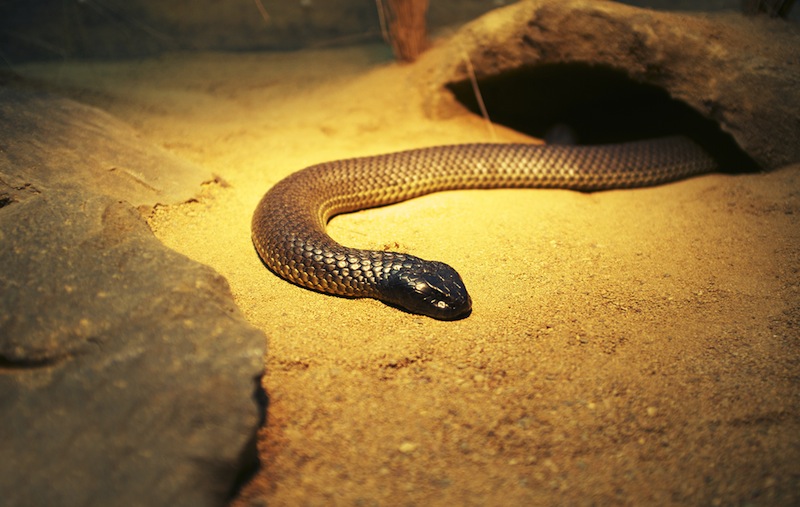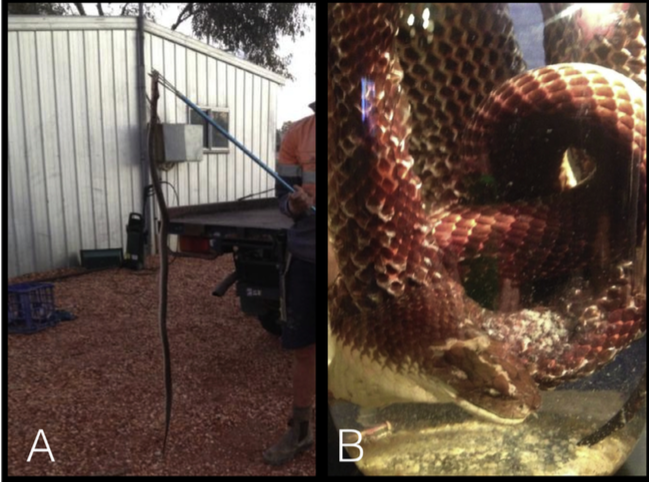Doesn't Make Scents? Snakebite Causes Man to Lose Ability to Smell

In an unusual medical case, a man in Australia lost his sense of smell for more than a year after he was bitten by a venomous snake, according to a new report of his case.
The man has since regained some of his sense of smell, but he is still unable to fully detect smells the way he did before his encounter with the reptile, called the mulga snake, said the doctors and other experts who examined the man's neurological condition about a year after he was bitten and who wrote the report of his case.
"As far as I know, he is still affected but somewhat improved," said Kenneth D. Winkel, a toxinologist at the University of Melbourne in Australia, who co-authored the report.
The otherwise healthy 30-year-old man went to a neurology clinic at St Vincent's Hospital in Melbourne, Australia, telling doctors that he'd lost his sense of smell about a year before and had not regained it. The man first noticed this bizarre symptom a week after he was bitten by a snake while he was traveling in the Australian outback.
The snake bit the man on two of his fingers while he was washing his hands at a roadside restroom, the man told the doctors. A local resident helped out, trapping the snake in the sink and killing it. The man preserved the snake in a jar of alcohol. [3 Unusual Snakebite Reactions]
Shortly after the incident, the man went to the emergency department of a regional hospital. The doctors who treated him there found that he had temporary problems with blood clotting, too much protein in his urine and blisters that oozed with a clear liquid.
The man stayed at that hospital for three days, during which his doctors gave him medication to prevent the bite wound from becoming infected.
Get the world’s most fascinating discoveries delivered straight to your inbox.
However, those doctors did not give the man anti-venom because they considered his symptoms to be "mild enough to not warrant anti-venom administration," according to the report, published Feb. 17 in the Journal of Clinical Neuroscience. The administration of anti-venom is normally recommended when a person is experiencing severe symptoms from a venomous bite, the authors of the report said.
A few days after the man was released, he noticed his sense of smell began to deteriorate, and within weeks, he completely lost the ability to smell.
A year later, when the man went to the neurology clinic at a different hospital, neurological tests confirmed that he was unable to detect smells — a condition that doctors call anosmia.
However, the examination of his nose and nervous system did not reveal any other abnormalities, which meant his anosmia did not have a structural cause and therefore was most likely caused by the snakebite, the researchers said.
Because more than a year had passed since the man was bitten and his loss of smell was severe, there was not much his doctors could do to treat his condition at that point.
Meanwhile, the snake specimen that the man had kept in the jar was sent to the Queensland Museum's herpetology department, where experts identified it as the mulga snake (Pseudechis australis).
The mulga snake is the largest terrestrial venomous snake in Australia, according to a previous study on mulga snake bites. In that study, which looked at 27 cases of people bitten by mulga snakes, the researchers noted that although the bites can be fatal, the most recent case of a fatal mulga snakebite was reported more than 40 years ago.
In most cases, bites from a mulga snake can cause symptoms such as inflammation at the bite site, muscle pain and destruction of blood cells. But effects on the nervous system rarely have been reported for bites inflicted by this snake species, the researchers said. However, cases of long-term and permanent anosmia attributed to bites by other types of snakes have been reported, the researchers said. [Oddest Medical Case Reports]
It's unclear how often people may develop anosmia after a snakebite, Winkel told Live Science. Overall, it appears to be "uncommon, but not rare," he said.
In a previous study done in Australia, researchers examined the effects of the bites from the red-bellied black snake, and found that 1 in 57 affected patients developed anosmia, he said. The red-bellied black snake (Pseudechis porphyriacus) belongs to the same family of snakes as the mulga snake, called elapids.
It is not clear whether administering anti-venom soon after a person is bitten may help prevent anosmia, the researchers said.
Follow Agata Blaszczak-Boxe on Twitter. Follow Live Science @livescience, Facebook & Google+. Originally published on Live Science.



